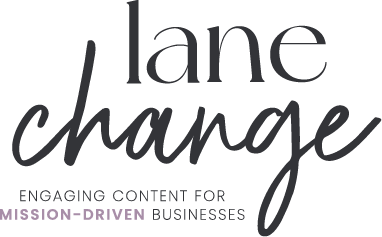Have you been hearing the term “content marketing” a lot lately? At first, those two words might not seem to go together. Both words can have many different meanings.
So, what is content marketing? And how do you use content to reach more clients and grow your business?
If you’re asking these questions—congratulations! You have good instincts, and you’re in the right place.
What is content marketing, anyway?
Content marketing simply means creating and publishing a specific type of visual and written asset intended to reach, engage and convert your ideal client. Not everything you create for your business is automatically content marketing.

Let’s look at what content marketing isn’t. Landing pages, commercials, print ads, and other forms of traditional advertising aren’t content marketing. But articles, lead magnets, whitepapers, newsletters, and eBooks are! The intention behind content marketing is to entertain or educate—not sell.
Content types to fit your business
To connect with your target audience, the information you’re sharing has to provide a solution to a specific and relevant problem. And the presentation—the type of content you’re creating—needs to be in a format your ideal client uses.
Content created for and used in successful marketing efforts comes in many forms, and not every type of content will work for your business. A great content marketer helps you narrow down your options to those that work best for the audience you have. Here are the top types of content we recommend:
1. Articles
Publishing and sharing high-quality, original articles is the primary, and most common, type of content marketing. Figuring out what topics and, if you’re confident in your writing skills, finding the time to write articles are the two biggest challenges for most business owners. That’s where a great content marketing support team really helps!
2. Lead magnets
While the immediate goal of content marketing isn’t sales, you still want to generate leads. A lead magnet is any piece of content—an eBook, a podcast episode, an instructional video, a one-pager, or a whitepaper—that users need to provide their contact information in order to access.

3. Whitepapers
A whitepaper is a long-form article that presents your unique solution or original research for a common problem in your industry. Ideally, a whitepaper does this to point your ideal client to your product or service as the solution to their problem. Whitepapers are a great way to establish your expertise, present your unique value proposition and connect with leads who are interested in solutions!
4. Newsletters
The primary purpose of a newsletter (at least in the context of content marketing) is to get audience members to return after their initial visit to your website or brick-and-mortar office. Whether the client came in for an annual appointment or exchanged their email address for your eBook, a newsletter positions you top-of-mind for referrals and purchases.
5. eBooks
An eBook can be a huge undertaking, but they’re also one of the most popular forms of content marketing. Given the perceived value eBooks provide, they are a great approach for reaching new clients. You can certainly focus on one topic and write completely new content. But you can also group together several of your previously published articles focusing on the same theme.
Deciding what type of content to include in your content marketing strategy is based on the characteristics of your ideal audience. But whatever format you choose, the content has to be original, helpful and engaging.
How does content marketing help your business?
Fortunately, content marketing in all forms yields high-impact results! Here are four benefits of executing a strong content marketing strategy:
1. Content marketing improves your SEO
Given the digital environment we all live in, improving your SEO is pretty much a universal goal. You can’t be found if you can’t be seen. And with all the noise on the internet, ranking on the first page of results for your desired keyword is an integral part of building your business.
While quality content is a requirement, quantity can’t be ignored. Google crawls and indexes individual pages, so the more articles you publish, the higher your chances of ranking.
2. Content marketing gives you higher domain authority
Domain authority is another one of those marketing terms that sounds made up—and it kind of is. This method of measurement was developed by the now ubiquitous SEO tool Moz as a means of predicting whether or not your website will actually rank in search engines. The better the content of your website, the more likely Google is to see your domain as an authority.
3. Content marketing increases your revenue
Content marketing can improve your conversions six times over. The effectiveness comes down to increased exposure and improved awareness. Publishing well-written content and communicating your message clearly establishes you as an authority in your field. As a result, your conversion rate, your retention rate and referral rate will improve.
Also, users respond to content marketing differently! Because potential customers interact with your content based on their own search, you know they’re interested in what you’re writing about. That means the leads you get from content marketing tend to be high-quality and are more likely to convert.
4. Content marketing is cost-effective
Compared to traditional marketing techniques, content marketing is far less expensive.
Creating original content costs about 60% less than other traditional, or even digital, marketing assets. Even if you spend the exact same amount on content marketing, you’ll be generating about three times the number of leads. The cost-effectiveness is significant!
Need help creating and executing a content marketing strategy? We’re here to help!








